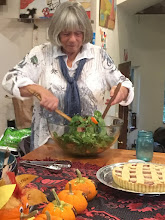(Note: This essay has no recipes attached because Mums closed long ago and I lost contact with any of the owners, so I had no way to ask for their recipes.)
As I was passing through the crowd at a Christmas wine-tasting gala a few years ago, someone called my name with joyful recognition. I turned to look but didn't recognize the speaker until he said, "It's Merrill. From Mums."
Immediately I felt a flood of gratitude.
Mums was a restaurant in Ashland in the mid-'70s. More than that, it was an atmosphere, a gathering place, a wild, hippie kind of thing popular for its good food creatively prepared and for the four men whose restaurant it was: Bobby, Ed, Frank, and Merrill. Frank lived at Houkola, the commune where I had come to live after being released from the mental ward at Rogue Valley Hospital, where I had been incarcerated with schizophrenia. (See www.dianacoogle.blogspot.com, June 15 and 29, 2017, for two posts about Houkola.)
"You were very strange," Merrill said that evening as we talked about those days.
Mariposa, one of the women at Houkola, had told me the same thing: that when I first came to the commune, she thought I was the strangest woman she had ever met. That strangeness was partly because of the schizophrenia, which, Carl Jung has said, is a shattering of the personality, and partly because of the Prolyxin, the drug I was taking that acted as a psychic strait jacket. As if in symbolic response to its function, it locked my head to my shoulders. The only way I could turn my head was to turn my torso. It was painful for me to be like that, though more emotionally painful than physically. Inside I was saying, "I'm not like this! I'm not like this!"
But what was I like? I was strange, even to myself, as I tried, piece by piece, to recollect my shattered personality, to remember who I was. I was still a mother to my toddler son, but he was living with his father most of the time, at that time, so what did that mean? I used to enjoy sewing, but what was there to sew now? I used to depend on my intelligence as part of my identity, but was I still intelligent? I wasn't sure.
Houkola had close ties to Mums both because Frank worked there and because we were friends with the other owner-cooks, too. Whenever any of us was in town, we ate there or dropped in to help. Many of the Houkola folks waited tables, prepared food, or washed dishes on a more or less regular basis. No one worked for pay. They volunteered their time because they appreciated Mums and wanted to help.
During the time I was struggling to overcome the effects of schizophrenia, someone suggested I, too, work at Mums.
Oh, but I couldn't do that! They wouldn't want me. I couldn't cook for someone else. I couldn't wait tables. For strangers?!
The idea wouldn't go away. I knew it would be good for me to work at Mums—if I could—so one day I gathered enough courage to ask the guys at Mums if I could work there. They never hesitated. They simply said, "Yes, of course." Even though I was a bit strange.
So I started work. Ed showed me how to chop vegetables with my thumb knuckle against the edge of the knife blade. Frank showed me how to crack garlic skins with a whack of the knife. I worked carefully and silently. All around me Merrill, Frank, Ed, and Bobby were laughing, talking, working to exhaustion. They were happy, energetic, creative: Bobby, the visionary; Frank, the comic; Ed, the most steady and, in many ways, the one I was closest to; Merrill, the one I could have loved if circumstances had been different. They talked to me normally and easily. They were friendly and curious but not intrusive. I began waiting tables, relating to strangers. I began to remember who I was.
I will be forever grateful to Mums. Merrill, Frank, Bobby, and Ed weren't acting like therapists, and the work I was doing was necessary work, but what they did for me was worth ten thousand of what I did for them. My work was unpaid, but I was being paid beyond measure. Just by being who they were and responding to me exactly as I was at the moment, they allowed me the space in which to become whole again. They were my healers. And it is for the healers we hold the most gratitude.

No comments:
Post a Comment